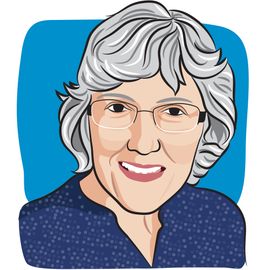- About Us
- Advertise / Support
- Editorial Board
- Contact Us
- CancerNetwork.com
- TargetedOnc.com
- OncLive.com
- OncNursingNews.com
- Terms & Conditions
- Privacy
- Do Not Sell My Information
- Washington My Health My Data
© 2025 MJH Life Sciences™ and CURE - Oncology & Cancer News for Patients & Caregivers. All rights reserved.
Standing Up to Cancer Means Not Letting It Steal My Joy

Kelly Irvin is a multi-published novelist and former newspaper reporter who worked in public relations for more than 20 years. She retired from her day job in 2016 after being diagnosed with primary lateral sclerosis, a degenerative motor neuron disease, and stage 4 ovarian cancer. She spends her days writing and loving her family.
Standing up to cancer means focusing on the blessings, reveling in good news, and living life to its fullest every day.
As I dressed for church one Sunday morning in late August, I contemplated the prompt from CURE editors regarding Stand Up to Cancer Day on Sept. 12. Write about how you stand up to cancer, they suggested. Mulling this topic, I put on a spiffy outfit, did my makeup, put my hair up in a bun, filled my travel bottle with tea, and made sure my small group study book was in my rollator.
I almost made it to the door when stomach distress hit. I didn’t make it to the bathroom. That’s when I knew what I would write about my efforts to stand up to cancer while living with stage 4 ovarian cancer. This isn’t a fuzzy, feel-good marketing campaign for those of us living with this disease. It’s an in-the-trenches, no-holds-barred, pull-up-your-big-girl-panties, day-to-day commitment to not letting cancer suck all the joy from our lives.
Diarrhea is a side effect of a clinical trial drug that is keeping my cancer at bay. I’ve been taking it—and living with diarrhea—for two years and eight months. My husband and I joke we should buy stock in certain anti-diarrheal medication. That’s okay, because in July my CT scan revealed I’ve reached a “complete response." My oncologist informed me I was “making history.” Take that, cancer.
Standing up to cancer means having the guts to enter into this phase I first-in-humans clinical trial. It means trusting my oncologist to steer me through the protocol that comes with these studies. It means taking it on faith that this study will help others as well—even when the study of this particular drug combination is halted before its projected completion date. It continues to help me and my oncologist believes another company will pick up the baton and carry it across the finish line. I’m thankful for his wisdom and his optimism. His support helps me to stand up to cancer every day.
Blessings are plentiful when you’ve been living with cancer for nine years. For example, I didn’t get to attend church in person that morning, but my church streams services on YouTube and Facebook. So I attended from the comfort of my home office, just steps away from a bathroom if I needed it. I’m so thankful for modern technology.
Because my cancer came with a loss of mobility that included all the symptoms of primary lateral sclerosis (PLS), a more benign form of ALS, my neurologist and the local ALS Association chapter arranged for me to receive the gift of a loaner portable power wheelchair from the Gleason Foundation. This loan gives me the freedom to attend events or travel to locations where a lot of walking might be required. Freedom is such an incredible gift.
Blessings also include the Phase I Clinical Trial Clinic only 30 minutes from my home, the staff there, my oncologist who founded a string of these clinics, and the ALS Clinic staff who have been taking care of me for the last ten years. Their contributions to my quality of life are far greater and brighter and lovelier than any low-down-and-dirty ugliness cancer can throw at me.
Standing up to cancer means appreciating and enjoying the time I spend with my husband, my two grown kids, and my four grandchildren. I love eating snow cones with my grandkids. I love tie dying t-shirts, playing Monopoly, reading books, watching movies, and pretending to run monster trucks through car washes with my grandkids. Joy, joy, joy. That’s how I stand up to cancer.
Cancer can’t take away joy unless I let it. That’s what I’ve learned. No matter how long or how short my time is, I get to decide how I spend that time. I get to decide what’s important. Not cancer. Me. Take that, cancer!
This piece reflects the author’s personal experience and perspective as a breast cancer survivor. For medical advice, please consult your health care provider.
For more news on cancer updates, research and education, don’t forget to subscribe to CURE®’s newsletters here.
Related Content:



